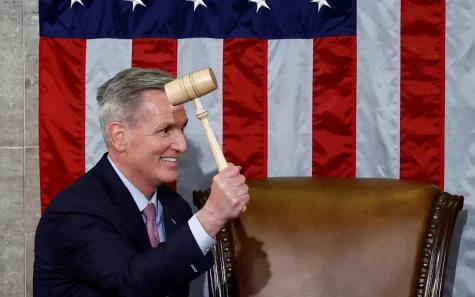McCarthy cedes power in historic House vote
February 20, 2023

Republican Kevin McCarthy was sworn in as 55th Speaker of the House in early January after a tumultuous 15 rounds of voting. His victory followed first female Speaker Nancy Pelosi stepping down after serving on and off for seven years. This came after a break-in and attack in her California residence which left her husband Paul Pelosi in critical but stable condition. Pelosi continues to serve as the Democratic Representative from California’s 11th district.
After the midterm elections, Republicans won a majority in the House. Voting for the Speaker took five days away from the House, meaning that all newly elected officials could not be sworn in and therefore get to work. McCarthy’s five days and 15 rounds of votes is one of the longest voting periods for a Speaker ever. This extended process places him in comparison with Speakers like Nathaniel Prentice Banks who needed 133 rounds of voting before his election in 1855. The major catalyst of the record number of voting rounds stems from the divide among House Republicans. Vocal members who have expressed their dislike for McCarthy include Trump supporters Matt Gatez of Florida and Lauren Boebert of Colorado. The Republican vote was split between McCarthy and four other House Republicans, with six of them being cast for former House member Lee Zeldin and former President Donald Trump.
“As an AP Gov teacher, I found the multiple votes for the Speaker exciting because it was unprecedented, so it was fun to go through some hypothetical scenarios with my classes,” Teresa Schneider said.
In order to gain the votes, McCarthy had to make numerous key concessions. First and foremost, McCarthy lowered the voting threshold on a motion to vacate the chair. This means only one member of Congress is required to force a vote in motion to remove or “oust” the Speaker from the chair. Other concessions include the publication of bills 72 hours before the final House vote, amendments can be made to appropriations bills, and his agreement to consider other suggested legislation like term limits for the House.
“I don’t think anyone should be making such a concession,” Sean Lyons (’24) said. “It starts off his term by showing he only has the power given to him by the other members. He’s third in line to the president and yet he’s treated like a child by some of these politicians. He’s fearful that if he doesn’t do everything they say then they will go against him and it will work, he’s a puppet for more radical viewpoints which will only further divide Congress as a whole.”
Only time will show the severity of McCarthy’s concessions as the 118th Speaker sworn in. The first major meeting is the current discussion with President Biden over the debt ceiling.
“It will be interesting for us to watch the House over the next two years to see if the concessions McCarthy made to the holdouts will impact the calendar and debate process in the House,” Schneider said.


